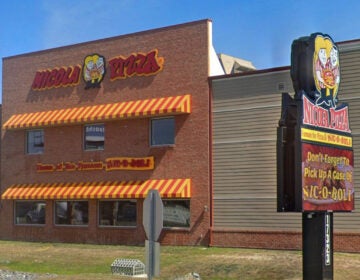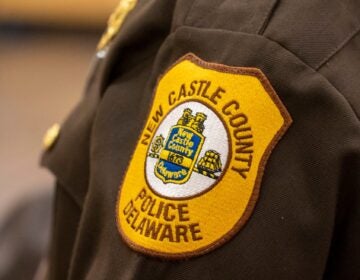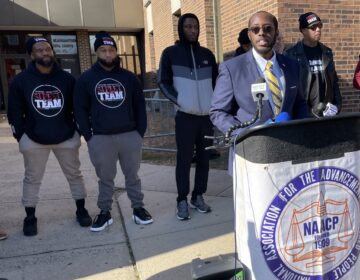Hate crime trial for former N.J. police chief will go to the jury on Monday
The defense only called one witness, an FBI agent on the case who called it “atypical.” Federal prosecutors and Frank Nucera Jr.’s attorneys will give closing arguments on Mon

Former Bordentown Police Chief Frank Nucera Jr. is pictured in a file photo. (File)
For the second time, the federal government has rested its case against Bordentown Township’s former police chief.
The retrial of Frank Nucera Jr. moved to the defense phase Tuesday morning before testimony wrapped up. Closing arguments will take place on Monday.
Nucera is facing charges of hate crime assault and depriving the civil rights of Timothy Stroye, a Black teenager who was arrested for trespassing at the Ramada Inn on U.S. Route 206 in September 2016. Nucera, who is white, is accused of pushing Stroye’s head into a metal door jamb at the hotel while he was in police custody. Prosecutors allege the attack is the culmination of resentment Nucera held against African Americans, as evidenced by his regular use of racial slurs, recorded on tape by one of his former officers.
The defense only called one witness, FBI Special Agent Arthur Durrant. He was a co-case agent from the beginning of the federal investigation into the incident until his promotion within the agency last year.
Durrant testified that the case overall was “atypical” because a law enforcement officer normally does not bring a civil rights complaint, as Bordentown Lt. Nathan Roohr did.
Then-Sgt. Roohr, the prosecution’s star witness, began secretly recording Nucera on his cell phone before the incident at the Ramada, capturing Nucera on tape using racial slurs against Black people. He continued recording him and other officers discussing what happened to Stroye. Roohr used the recordings to make a civil rights complaint against Nucera. He turned over 81 one recordings to federal investigators and worked with them to record conversations with other officers about the incident at the Ramada.
Durant testified it’s also atypical for someone to make their own recordings prior to the FBI getting involved.
FBI Special Agent Vernon Addison said he listened to the “many, many hours” of recordings.
Roohr deleted some of the recordings he made before the Ramada incident. The defense has stipulated that the government only has Roohr’s word on the recordings he deleted.
“We would prefer that [the recordings] not be deleted,” FBI Special Agent Vernon Addison said on cross-examination by the defense.
Prior to Durrant’s testimony, Nucera notified the court that he would maintain his right to remain silent and not testify in his own defense.
Before prosecutors finished presenting their case, they, along with the defense, stipulated that a former township employee, who testified in the first trial, worked closely with Nucera in his capacity as township administrator. The government and defense said Colleen Eckert, who described Nucera as a close friend, would have testified that she heard him use a shortened version of the N-word to describe a town developer.
Eckert worked for Bordentown Township from 1996 until her resignation in 2019, spending the last nine years on the administrative team. Her resignation came after the township committee discovered that she also used the slur when describing the developer, former NFL player Kevin Johnson.
Eckert said Nucera, who also served as the township’s administrator, as well as its police chief, oversaw personnel matters, including the police department. Because of that, officers feared retaliation from him if he learned they were cooperating with the FBI, according to prosecutors.
Addison, who was cross-examined by Nucera’s attorney Rocco Cipparone Jr., said he sent a text message to Brian Pesce, the current police chief who was a lieutenant overseeing internal affairs at the time of the incident, after speaking to then-Sgt. Nathan Roohr.
Displayed on a screen in the courtroom was a message Addison wrote to Pesce:
“Fyi, you may get pressed hard when he sees you,” he wrote, referring to Nucera.
Addison added he did not recall if Pesce was ever confronted by Nucera over the FBI looking into the Ramada incident.
Prior to wrapping up the court session, Federal District Judge Robert Kugler read final instructions to the jury ahead of closing arguments.
Kugler did so while sitting in the witness box so he could be on mic.
As he read the instructions and explained the law to be applied, the mostly white jury followed along. As Kugler turned the page to explain what they can consider and what they can’t, so did members of the jury.
“I play no part in finding the facts,” Kugler told the jury. “You should use your common sense in weighing the evidence.”

Get daily updates from WHYY News!
WHYY is your source for fact-based, in-depth journalism and information. As a nonprofit organization, we rely on financial support from readers like you. Please give today.







